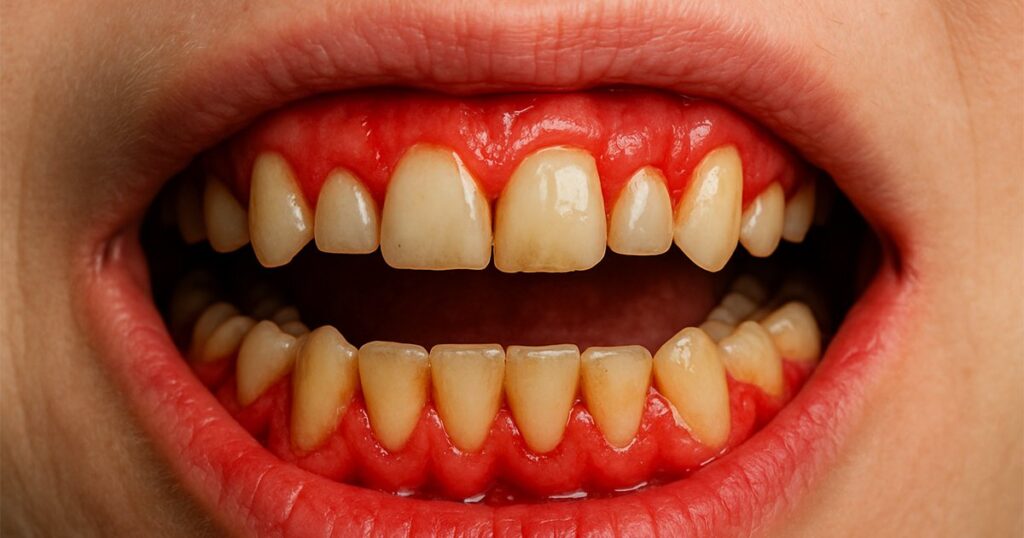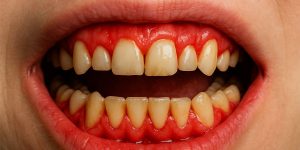Neglecting gum disease can seriously compromise your body’s overall health. That’s why dental professionals recommend regularly monitoring your gum health and acting immediately if you notice any concerning signs.
In the early stages, it’s possible to restore gum health with at-home treatments. However, if the disease is widespread and causing further complications, it’s best to visit a dentist and seek professional care, such as Deep Cleaning & Soft Tissue Evaluation.
In this blog, we’ll discuss everything you need to know about gum disease, its impact on your health, and effective treatments to address this issue.
What Causes Gum Problems?
The primary reason behind gum disease is dental plaque. Multiple factors enable bacteria to accumulate on the gums, exposing the tissue to irritation, inflammation, and even infection.
Additionally, key risk factors include:
- Poor oral hygiene
- Inconsistent cleaning
- Smoking or chewing tobacco
- Changes in hormones
- Shifts in systemic health conditions
- Certain medications and treatments
- Unhealthy lifestyle and poor diet
- Anatomical issues
Moreover, there are some habits that, although they cannot cause gum disease, can worsen it. For example, brushing too hard.
Overall, you can prevent this issue by following some health tips, such as forming good oral care habits, quitting tobacco, adopting a healthier lifestyle, and addressing any structural issues with your teeth.
Even though it can be painful, gum disease is manageable. Even if you’re experiencing severe pain in your mouth due to damaged tissues, there are several ways to restore gum health.
How to Restore Gum Health at Home
Whenever you notice signs that your gum health is at risk, start adopting preventive methods immediately. Regardless of the level of disease, preventive measures such as brushing your teeth twice a day, interdental cleaning, and rinsing your mouth with water can help prevent the problem from worsening.
Additionally, swishing salt water for 30 seconds, two or three times a day, has been proven to be an effective at-home treatment for overcoming this issue. Swishing hydrogen peroxide can have a similar effect and be beneficial in treating gum disease.
Our dentists also recommend some traditional methods for restoring gum health. For example, swishing 1 tablespoon of coconut or sesame oil in your mouth for 10 to 20 minutes a day helps reduce harmful bacteria and prevent plaque buildup.
Applying aloe vera gel to the infected gum, leaving it in place for a few minutes, and then rinsing it away with water can help decrease pain and inflammation. Drinking one or two cups of green tea daily can also help your body’s immune system to fight inflammation and other problems caused by gum disease. Moreover, green tea is helpful in preventing gum disease.

Please note that you should use these at-home treatments when gum health is mildly compromised. For advanced gum disease, you’ll need professional care provided by a dentist.
Professional Treatments That Help
Let us break this section into two parts and discuss various methods that can help restore gum health:
Non-surgical Treatments
A professional cleaning, using specialized instruments, removes plaque, which we mentioned as the primary reason for compromised gum health, and can address early gum disease.
Whenever periodontal pockets develop, dentists remove plaque and calculus from below the gum line and prevent gum disease from extending. This procedure is usually done under local anesthesia.
In more severe cases, dentists may decide to place antibiotics directly into the periodontal pockets. This is necessary when a bacterial infection is serious and initial treatments alone are not enough. Therefore, antibiotics kill bacteria in deep sites and help restore gum health.
Lastly, Laser Periodontal Therapy is a non-surgical treatment in which the dentist uses dental lasers to remove diseased tissues, eliminate bacteria under the gums, and accelerate the healing process.
Surgical Treatments
Serious issues compromising significant tissue or bone loss require dentists to use more advanced surgical treatments. In such circumstances, dentists decide to address the issue with one of the following:
- Pocket reduction or flap surgery
- Gum grafts
- Soft tissue grafts
- Bone grafting
- Regenerative procedures
- Dental bonding or root surface coverage
You may ask when to move beyond at-home treatments and book an appointment for advanced treatments. We’ll answer this question in the next section of the blog.
Do You Need Advanced Gum Disease Treatment?
If your gum health is seriously at risk and at-home treatments are no longer effective, call us now to book an appointment and receive expert care to restore your gum health.
When to See a Dentist
Everyone prefers to resolve this issue with at-home treatments. However, sometimes you’ll have no choice but to visit a dentist and ask for their help. Unattended gum disease will worsen and require you to see a dental professional to resolve the issue. So, if you ignore signs such as bleeding, red, swollen, or sore gums and don’t adopt at-home treatments, you’ll probably end up needing advanced procedures, whether surgical or non-surgical.
If improving oral care and other traditional methods don’t work after one or two weeks, it’s a clear sign that you should book an appointment and consider professional care. Otherwise, your gum health will worsen. Please note that if you have health risk factors that can accelerate the progression of the disease, visiting a dental professional becomes even more important.
In summary, if at-home treatments don’t help, schedule an appointment with a dentist. The sooner, the better. The health of your gums has a direct impact on your overall health.
Gum Health and Overall Health
Inflammation caused by gum disease can spread bacteria into your bloodstream. This raises the risk of heart disease, stroke, and diabetes complications.
Some studies suggest that poor gum health can also impact birth outcomes. The results indicate that gum disease can lead to preterm birth and low birth weight.
Due to oral bacteria entering the body, gum disease may increase the risk of respiratory infections and other chronic conditions.
Moreover, we can’t ignore the effect of this condition on the quality of life. Severe pain, bad breath, and, in some cases, tooth loss are common consequences of ignoring gum disease in its early stages and allowing it to progress.
Read More: What Are the Most Common Causes of Bad Breath?
Final Tips and Next Steps
To ensure your gum health isn’t at risk and manage gum disease more effectively, adhere to the following:
- Form a healthy daily habit, such as a solid oral care routine, and stick to it.
- Use the right tools, such as a soft-bristle brush, proper toothpaste, and high-quality floss.
- Adopt a healthy lifestyle that promotes gum health recovery.
- Monitor the health of your gums regularly and act promptly if you notice any signs of disease.
- Brush your teeth gently to ensure that cleaning won’t damage your gums.

Taking these tips seriously will help you restore gum health quickly and prevent serious consequences from neglecting this important issue.
Restoring Gum Health: Ensuring a Better Quality of Life
It is essential to note that damaged gums can compromise your overall health and affect other body systems. Therefore, immediate action to treat gum disease is crucial to prevent further complications.
Poor oral care and dental plaque are the main factors that harm gum health. To resolve this issue, you can try at-home treatments, such as swishing salt water in your mouth.
However, if the situation worsens and basic treatments are ineffective, consider visiting our dentists at Leslie North Dental if you’re in Newmarket to restore your gum health. Our specialists use specialized instruments to relieve your pain and protect your overall health by treating your gums.
FAQ
Can gums grow back after receding?
No, receded gums don’t naturally grow back once the tissue is lost. However, you can restore gum health by preventing further recession through proper home care and professional treatments. In more advanced cases, dentists may use gum grafting to cover exposed roots.
How long does it take to restore gum health?
Mild gum problems like gingivitis can start to improve within one to two weeks of consistent brushing, flossing, and rinsing. More advanced issues, such as gum recession or periodontitis, take longer and often require professional treatments to restore gum health and stop further damage.
Is bleeding when brushing a sign of gum disease?
Yes, bleeding gums while brushing or flossing is often an early sign of gingivitis, the first stage of gum disease. If the bleeding continues despite good oral care, it’s essential to consult a dentist to prevent it from progressing into more serious gum health issues.
Can poor gum health affect my overall health?
Yes, poor gum health has been linked to serious conditions like heart disease, diabetes, and respiratory problems due to the spread of inflammation and bacteria through the bloodstream. Taking steps to restore gum health not only protects your teeth but also supports your overall well-being.
We’d love to hear how you take care of your gums. Have you ever dealt with gum disease or tried natural remedies like salt water rinses or green tea? Share your experiences, challenges, or tips in the comments.





